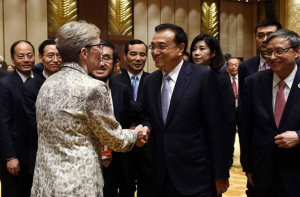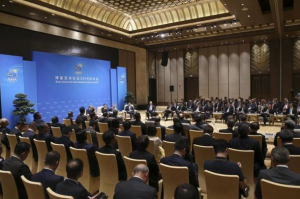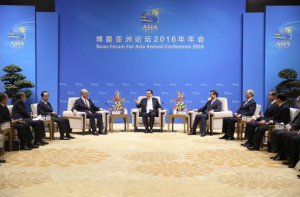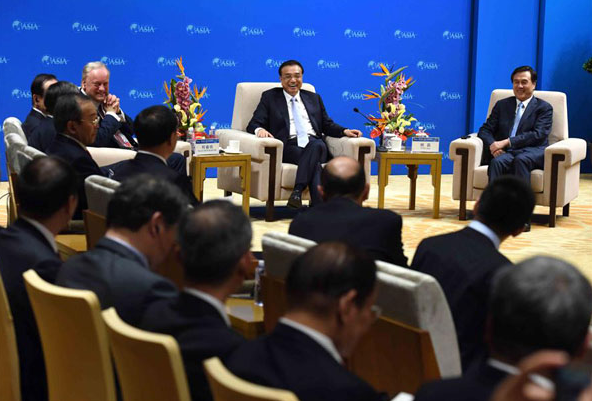aNewDomain, Bo’ao, Hainan Province, China — Along with about 170 international business CEOs, tech entrepreneurs and think-tank directors, I was bussed out to a People’s Republic of China government guest house on Thursday to participate in a one-hour, closed-door dialogue with Chinese Premier Li Keqiang.
— Along with about 170 international business CEOs, tech entrepreneurs and think-tank directors, I was bussed out to a People’s Republic of China government guest house on Thursday to participate in a one-hour, closed-door dialogue with Chinese Premier Li Keqiang.
The dialogue was an offsite event held in conjunction with the 2016 Boao Forum for Asia, held here on the Chinese island of Hainan this week in Bo’ao, China.
 Li told the business leaders in attendance that China, now in “economic transition,” encourages more participation from foreign businesses.
Li told the business leaders in attendance that China, now in “economic transition,” encourages more participation from foreign businesses.
“We will continue to press ahead with opening up (China),” he told the group. “We will open up sectors where state-owned enterprises (SOEs) are monopolizing in order to enable the participation of foreign entities. This will foster competitiveness,” he said, adding that “we will treat them as equals.”
“The government will create an even playing field” for all competitors, he said. “And the government will gradually ease restrictio ns and expand market access” so foreign businesses can more easily compete.
ns and expand market access” so foreign businesses can more easily compete.
“Unhealthy competition cannot lead to lasting success,” Li added.
The premier didn’t specify which state-owned monopolies China will break up or in which industries, but said the participation of private and foreign companies is critical for China’s economic growth.
Toyota Chairman Takeshi Uchiyamada was first of a half dozen executives to address Li in the closed-door session. Toyota, which sold 1.3 million cars in China last year, hopes to more closely cooperate with Chinese carmakers to produce new hybrid cars and other new energy vehicles, Uchiyamada said.
Last October, Toyota began selling two of its hybrid car models in China,  he said.
he said.
Japan has been addressing environmental issues for longer than China has, he told Li, and Toyota and other Japanese carmakers have valuable experience to offer up to Chinese carmakers in this regard.
Li appeared to approve of the idea. Green development “is part of our economic transition program,” he said, and is encouraging the development of such new energy vehicles. In particular, he told the Toyota chief, Li would like to see Japanese companies, “especially Toyota,” increase “cooperation with Chinese car companies on these projects.”
China currently offers subsidies to domestic companies making new energy vehicles, he said, “and such subsidies will be granted to overseas automobiles as well.”
Last month, China’s State Council announced it was building an innovation platform that would heavily award enterprises who made big strides in vehicle battery research, sales and support and outlined five measures to support the development of the new battery industry in China.
Other business leaders addressed Li regarding the premier’s comments, earlier in the week, about righting the Chinese economy so that the “new mediocre” (low growth, low inflation) does not become the “new normal.”
Last year’s, China’s $10 trillion-plus economy had its lowest growth in 25 years. Current reforms, said government economists earlier in the week, will ease China off its ongoing reliance on debt-investment and increase its focus on consumers and services.
“We are experiencing an upgrade and transformation process, and the economy inevitably has throes,” Li said, adding that the economy looks “good and stable” so far in 2016. “We have more policy tools for the Chinese economy to maintain steady and long-term growth,” he added.
Deloitte Global Chairman David Cruickshank told Li that Cruickshank’s firm supported China’s continuing economic reforms. The firm is soon to announce 100 years of doing business in China. Li congratulated Cruickshank for the firm’s long tradition of working with Chinese companies from within and promised him and the group that China is committed to “stay open.”
“There are more hopes than difficulties,” Li told the group.
For aNewDomain, I’m Gina Smith.













